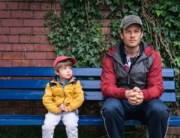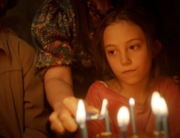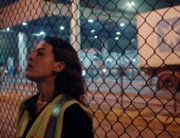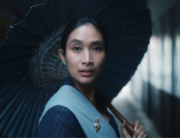
For many of us (myself included), it might feel too soon to see the pandemic represented on screen. Distance and perspective are often required to dramatize historical events in a compelling and poignant way. Besides, many, understandably, will want something else to think about when they watch a movie.
All that being said, The Year of the Everlasting Storm is largely a fine, varied, and refreshing experience. Filmmakers from all over the world (Jafar Panahi, Anthony Chen, Malik Vitthal, Laura Poitras, Dominga Sotamayor, David Lowery, and Apichatpong Weerasethakul) have contributed shorts for this anthology in which, both directly and indirectly, they comment on our confined circumstances. While it might not offer the depth that future filmmakers might achieve, it speaks well to the talents of the directors represented, and contains passages that are moving and unexpected.
The films contrast in terms of style and approach. Panahi’s, which is a sort of poetic, nonfiction piece set in his home while his mother visits, is shot on a handheld camera and is sometimes a little jerky; Vitthal’s is composed entirely of FaceTime videos and animation; Poitras has made a documentary, much of which features, among other things, talking heads on Zoom.
The other four are filmed with dramatic lighting and resemble narrative films—with the exception of Weerasethakul’s, which mostly features bugs crawling around on an empty bed. This one takes as its theme the presence of nature that surges forward in human absence, and contains audio clips from recent demonstrations for democracy in Thailand. Like his full-length films, it will challenge the patience of many viewers, yet those who stick with it will be rewarded with a striking meditation.
A number of the pieces concern families in some way. Panahi’s involves his aging mother, Chen’s depicts a couple struggling to raise their child and stay above water in the early months of the pandemic, Sotamayor highlights a Chilean family on their way to visit a newborn child, and Vitthal’s concerns a man and his long journey to gain custody of his children. Lowery’s cryptic contribution involves someone who follows the instructions from old letters to find where a father buried his son.
Some aspects of these works could be seen as sentimental. Occasionally, devices like the gradual recording of a song or the hatching of an egg, speak to the persistence of life in the face of adversity in a way that might make some viewers’ eyes roll. Broadly, these films are engrossing in their own right, and each illuminate different aspects of our need for connection.
The only real dud of the bunch is Poitras’s: it feels out of place. It is a streamlined, very serious documentary about surveillance and cyberweapons, and features an investigation on the subject conducted during the pandemic—an important subject that demands a fuller treatment. It is also done no favors juxtaposed with the others, though there is much enjoyment to be found in watching how the short films contrast one another. This one seemingly has so little to do with the others that its presence is jarring, and the subject comes across as underexplored.
The two standouts are by Anthony Chen and David Lowery. Chen succeeds in creating a realistic depiction of a struggling couple, and portrays believable, imperfect people dealing with a handful of problems in their relationship and their homelife. We palpably feel the atmosphere of the early pandemic in this tense little drama. Lowery’s has nothing overt to do with the pandemic—we only see characters wearing masks—and it is mysterious. We are never quite sure who the protagonist is or what her relationship is to the writer of the letters. Aspects of the writer’s voice-over that accompanies her road trip are overwrought, but the film is still absorbing, and contains some haunting twists worthy of Lowery’s best work.
It is unclear how this project will stand the test of time, but know that it exceeded this reviewer’s expectations, and is much better than the flood of “quarantine content” of the early days of the pandemic. It is heartening and surprising.






Leave A Comment